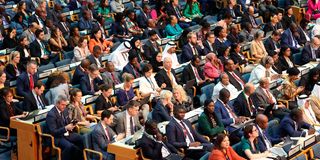Why Nairobi UN conference could sideline civil society

Delegates attending the opening of the sixth session of the United Nations Environment Assembly (UNEA-6) at the United Nations Environment Programme (UNEP) headquarters in Nairobi on February 26,2024.
Early next month, activists from around the world will converge on Nairobi for the annual United Nations Civil Society Conference. It’s one of the most important civil society meetings of the year.
Ironically, this year’s event, slated for May 9-10, might sideline civil society from UN decision-making rather than give global activists a chance to influence the world body. And without civil society, the UN will struggle to achieve its goals.
Here’s why. The theme of the Nairobi conference is the “Summit of the Future”, after a meeting that is scheduled for September in New York.
The UN calls the summit a “once-in-a-generation opportunity” to reform global governance amid a world beset by conflict, climate change and economic inequality.
At the summit, governments will agree to reforms contained in a document, the “Pact for the Future”. It is vital that the pact incorporates civil society feedback so that people as well as governments can have a say.
To that end, the pact is the top agenda item at the Nairobi conference, which the UN has said will be a “space for civil society to contribute ideas and recommendations to feed into the negotiations of the pact”. But that will be difficult.
Germany and Namibia—who drafted the pact—will finish most of their revisions before the Nairobi meeting, leaving little room for civil society input.
Meanwhile, the organisers only confirmed attendance for applications only a month to the D-Day—not enough time for many activists outside East Africa to arrange travel. This small window will likely skew attendance toward larger, wealthier, Global North organisations, though Global South voices are necessary to ensure equitable decision-making.
But even activists who make it to Nairobi might struggle to impact September’s summit because, unlike the past ones, the 2024 conference won’t have an official “outcome document”. Without such a document, civil society will have no official way to follow through on the other main agenda item: Devising ways to help implement the summit’s reforms and monitor government commitments.
The conference co-chairs said they cancelled the document to acknowledge the diversity of civil society voices beyond those in attendance. But then, the organisers of the conference and the summit didn’t do enough to include diverse representatives.
None of this would cause alarm had the pact incorporated diverse civil society inputs. But the initial zero draft only mentions “civil society” once and says nothing about protecting civic space. The co-authors also left out a crucial civil society demand for a UN Civil Society Envoy, who could help to prevent the very problems plaguing the Nairobi meetings.
It’s clear that civil society is being sidelined. And as we’ve seen with the failing Sustainable Development Goals (SDGs), when civil society is unable to participate due to the closing of civic space, results suffer. Sadly, this outcome satisfies some repressive governments, who prefer to exclude civil society with its focus on transparency and accountability.
Still, we can salvage Nairobi’s civil society conference and, with it, the Summit of the Future.
First, Germany and Namibia should strongly encourage governments and the UN to meaningfully consult civil society—particularly those who can’t make it to Nairobi—before moving to the next revisions of the pact. Next, they should include a call in the pact for governments to protect civic space and for a Civil Society Envoy. Lastly, the conference should reinstate the outcome document and ensure it is incorporated into the pact and the summit.
Many agree the summit is a “once-in-a-generation opportunity”. But unless the UN makes changes to the Nairobi meet, the Summit of the Future could end up repeating the mistakes of the past.
- Ms Rana is the UN adviser for Civicus in New York. [email protected]. @Jesselina_Rana





